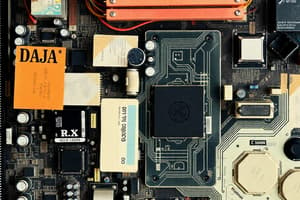Podcast
Questions and Answers
What are the three processes involved in urine formation?
What are the three processes involved in urine formation?
- Glomerular filtration, tubular reabsorption, and tubular secretion. (correct)
- Renal tubule movement, glomerular secretion, and plasma filtration.
- Tubular secretion, plasma filtration, and renal reabsorption.
- Glomerular reabsorption, tubular secretion, and urinary excretion.
What happens during glomerular filtration?
What happens during glomerular filtration?
- Movement of water and solutes from blood plasma into the renal tubule (correct)
- Movement of water and solutes from renal tubule into blood plasma
- Movement of urine from renal tubule into blood plasma
- Movement of blood plasma from renal tubule into urine
What does tubular reabsorption involve?
What does tubular reabsorption involve?
- Reabsorption of filtered water and useful solutes back into the blood (correct)
- Secretion of wastes, drugs, and excess ions into the fluid
- Movement of urine from renal tubule into blood plasma
- Movement of blood plasma from renal tubule into urine
What does tubular secretion involve?
What does tubular secretion involve?
What is the function of tubular secretion?
What is the function of tubular secretion?
What percentage of plasma passing through the glomerulus is filtered?
What percentage of plasma passing through the glomerulus is filtered?
What percentage of filtered fluid is excreted?
What percentage of filtered fluid is excreted?
How efficient is the urine formation process?
How efficient is the urine formation process?
What is not filtered in glomerular filtration?
What is not filtered in glomerular filtration?
Where do water and solutes move across in glomerular filtration?
Where do water and solutes move across in glomerular filtration?
Which process involves the movement of urine from the renal tubule into blood plasma?
Which process involves the movement of urine from the renal tubule into blood plasma?
What is the function of tubular reabsorption?
What is the function of tubular reabsorption?
Flashcards are hidden until you start studying
Study Notes
- Urine formation involves 3 processes: glomerular filtration, tubular reabsorption, and tubular secretion.
- Glomerular filtration involves the movement of water and solutes from blood plasma into the renal tubule.
- Tubular reabsorption involves the reabsorption of about 99% of filtered water and useful solutes back into the blood.
- Tubular secretion involves the secretion of wastes, drugs, and excess ions into the fluid.
- Tubular secretion removes substances from the blood.
- Only 20% of plasma passing through the glomerulus is filtered.
- Less than 1% of filtered fluid is excreted.
- The process is highly efficient.
- Proteins are not filtered in glomerular filtration.
- Water and solutes move across the wall of glomerular capillaries.
Studying That Suits You
Use AI to generate personalized quizzes and flashcards to suit your learning preferences.




